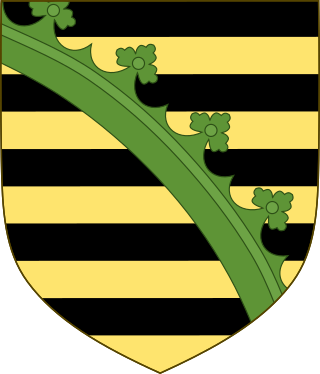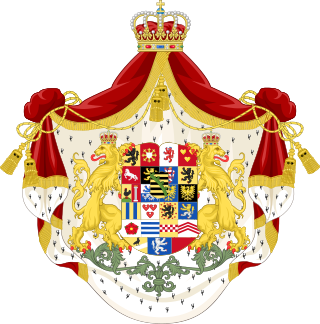Prince Albert most commonly refers to:

The House of Wettin was a dynasty of German kings, prince-electors, dukes, and counts that once ruled territories in the present-day German states of Saxony, Saxony-Anhalt and Thuringia. The dynasty is one of the oldest in Europe, and its origins can be traced back to the town of Wettin, Saxony-Anhalt. The Wettins gradually rose to power within the Holy Roman Empire. Members of the family became the rulers of several medieval states, starting with the Saxon Eastern March in 1030. Other states they gained were Meissen in 1089, Thuringia in 1263, and Saxony in 1423. These areas cover large parts of Central Germany as a cultural area of Germany.
Albert I was a Duke of Saxony, Angria, and Westphalia; Lord of Nordalbingia; Count of Anhalt; and Prince-elector and Archmarshal of the Holy Roman Empire. Even though his grandfather Albert the Bear had held the Saxon dukedom between 1138 and 1142, this Albert is counted as the first.
Prince Alexander may refer to:

The House of Saxe-Coburg and Gotha is a European royal house. It takes its name from its oldest domain, the Ernestine duchy of Saxe-Coburg and Gotha, and its members later sat on the thrones of Belgium, Bulgaria, Portugal, and the United Kingdom and its dominions.
Augustus was the first emperor of ancient Rome.

Magnus, called Magnus with the Necklace or Magnus II, was Duke of Brunswick-Lüneburg, ruling the Brunswick-Lüneburg principalities of Wolfenbüttel and, temporarily, Lüneburg.

The Ernestine duchies, also known as the Saxon duchies, were a group of small states whose number varied, which were largely located in the present-day German state of Thuringia and governed by dukes of the Ernestine line of the House of Wettin.
Anna of Saxony (1544–1577), was the daughter of Maurice, Elector of Saxony and wife of William the Silent.

Prince Albert of Saxe-Altenburg was a German prince of the ducal house of Saxe-Altenburg.

Ernst II was the last reigning duke of Saxe-Altenburg and a German general active during World War I.

The coat of arms of the present-day German free state of Saxony shows a tenfold horizontally-partitioned field of black (sable) and gold/yellow (or) stripes, charged with a green (vert) crancelin running from the viewer's top-left to bottom-right. Although the crancelin is sometimes shown bent (embowed) like a crown, this is due to artistic license. The coat of arms is also displayed on the state flag of Saxony.
John II of Saxe-Lauenburg was the eldest son of John I of Saxony and Ingeborg Birgersdotter of Småland, a daughter or grandchild of Birger jarl. He ruled the Saxony jointly with his uncle Albert II and his brothers Albert III and Eric I, first fostered by Albert II until coming of age. In 1296, John II, his brothers, and their uncle divided Saxony into Saxe-Wittenberg, ruled by Albert II, and Saxe-Lauenburg, jointly ruled by the brothers between 1296 and 1303 and thereafter partitioned among them. John II then ruled the branch duchy of Saxe-Mölln, later extended to become Saxe-Bergedorf-Mölln. In 1314, he officiated as Saxon Prince-elector in an election of a German king.
Albert of Saxe-Wittenberg may refer to:
Catherine of Brunswick may refer to:
Events in the year 1902 in Germany.
This page is based on this
Wikipedia article Text is available under the
CC BY-SA 4.0 license; additional terms may apply.
Images, videos and audio are available under their respective licenses.






